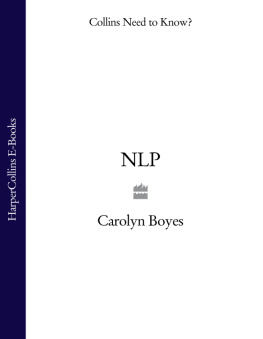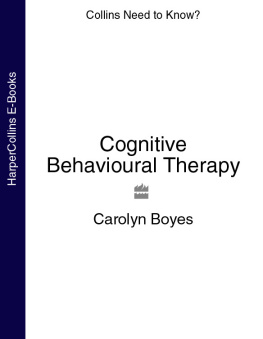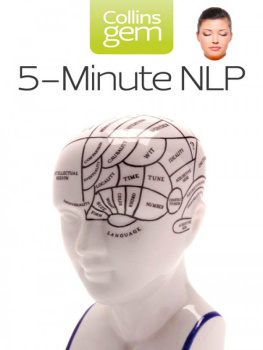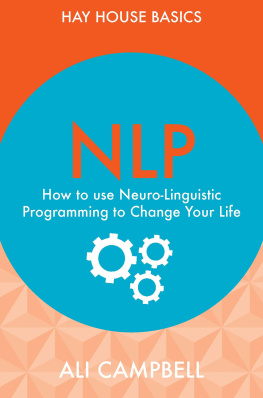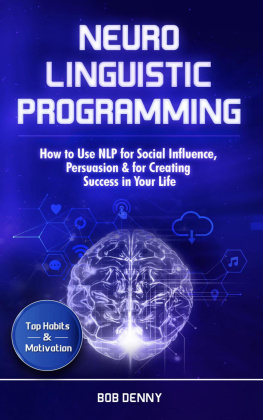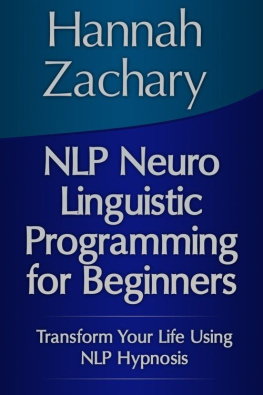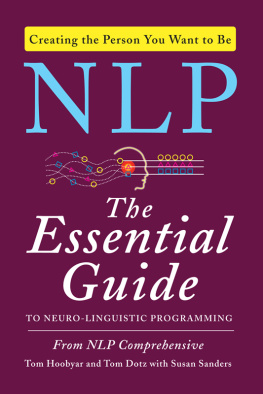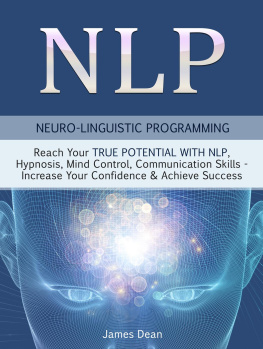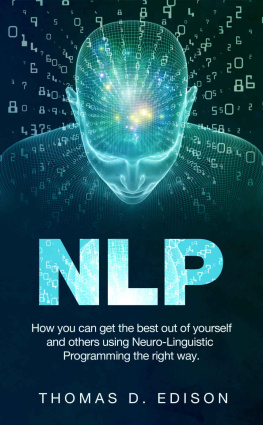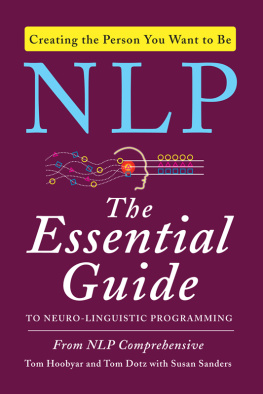
Neuro-Linguistic Programming (NLP) is a way of thinking about how the world works. It is the study of excellence and how you can achieve it. This book explains what Neuro-Linguistic Programming has to offer and how you can use it for success in your everyday life.
Why read this book?
Whatever you do for a living and whatever stage you are at in your life, whether young, middle aged or elderly, Neuro-Linguistic Programming can help you achieve more. If you are a business person, if you are in a relationship, if you want to improve a sport, get rid of a phobia, have greater satisfaction in your social life or change a habit, there are NLP techniques that you can use to create new results.
It may be that you would like to be a better communicator, have smoother relationships, greater career success, more money or just know yourself better. Perhaps you are very successful in conventional terms but there are still things you would like to change within yourself. N LP can show you how.
In your personal life, NLP can show you ways to create a personally fulfilling and happy life. In other words, you can use NLP to coach yourself. In business, you can use NLP to coach your colleagues, for sales, for presentations and for improved communication and management. You can also use NLP for personal coaching for example, to help a person to get rid of a limiting belief or an unwanted habit, to refine his goals or to work with a series of issues.
How does NLP work?
NLP is concerned with how the top people in any area consistently achieve results. It is more than a way of thinking about success, though it also provides a series of practical techniques that can be easily learned and applied to any area of life.
The belief that lies behind NLP is that each person who achieves outstanding results has a method, process and structure by which he does so. NLP analyses that persons thinking and behaviour to make a model of excellence that anybody can use to replicate his success. Next, NLP takes this model and shows you how you can apply it not only to replicate the successful methods of others but also to create your own successes. NLP can also be used as a way of understanding the methods by which you achieve good results and how you can reproduce them on a consistent basis.
Thousands of people all over the world have already found NLP can create improved results in many areas of their life. In any of these areas, NLP can help you to make use of your inner potential, create a vision and purpose, set effective goals and achieve them.
How to use this book
This book is for anyone who wants to explore what NLP is about or who wants to know more about the techniques anyone who wants to learn a process that can improve his quality of life.
Chapters 1 to 5 explain the basic principles of NLP. The following chapters go into detail about the different techniques that you can use to remove barriers and move towards success. Chapter 11 brings everything together and looks at how you might work with another person. There is also a useful glossary of NLP terms and a bibliography at the end of the book.
The aim of the book is that you will be able to use your new skills to improve your life. You can begin to use these skills straightaway. They are all tried, tested and highly practical. The more you are able to practise them, the better. You may find it useful to find opportunities to practise them as you go through the book, as you will find this helps your understanding grow. So do take the time to try them out with yourself or others.
Most importantly, NLP is about experimenting and enjoying new things, so have fun!
NLP is a way of thinking and a method for achieving excellence in your life. Its structure comes from modelling people who have already achieved success in many different areas. You can transfer these ways of thinking, doing and being to your life to achieve results. This chapter sets out the groundwork you need to know before you can start to apply NLP to your daily life. Whatever you have and are doing or being in your life is because of what you believe is true about the world. What would happen if you changed some of those beliefs?
Whats in the name?
The name Neuro-Linguistic Programming refers to the unconscious processes each person uses to produce behaviour and therefore results. If you are not achieving the results you want, change your thinking and your behaviour will change.
Neuro
Each component of the name is important. The word neuro refers to the nervous system. Our direct experience of the world comes to the brain via the nervous system and the five senses. The senses are the means by which we interact with the world:
the visual sense seeing
the auditory sense hearing
the kinaesthetic sense touch
the olfactory sense smell
the gustatory sense taste
One of the first things that NLP is concerned with is how we process this sensory experience and translate it into conscious and unconscious thought.
Linguistic
The second word in Neuro Linguistic Programming refers to language. Specifically it means the way in which we use language to order and give meaning to what we have experienced through the senses.
must know
Its not what happens to you thats important. Its what you do with what happens that makes the difference.
Communication both verbal and non-verbal types is the medium by which you express the unconscious and conscious thoughts you have about yourself, other people and the world around you as a whole.
Programming
The third word in Neuro Linguistic Programming looks at the consistent ways in which we think or behave. Just like a computer, each of us runs specific programmes to produce our behaviour. Programmes consist of a series of steps that automatically produce certain results in different circumstances.
You can use NLP to find out what particular programmes you run and what results they produce. It also gives you the means to change your own and other peoples programmes to produce exactly the results you want.
The core of NLP
At the heart of NLP is a particular way of thinking. This holds that anyone can achieve success by learning how other people get their results. This is called modelling.
Modelling
To model someone, you identify a person who does something excellently and you observe how he does it, specifically by looking at, questioning and analysing him to discover:
that persons language, i.e. the words he uses and the structure of his language
his physiology, i.e. how he uses his body
his thinking, beliefs and values, unconscious and conscious.
must know
In essence, NLP consists of:
a methodology modelling
a series of techniques
By copying what that person does in these three areas, you can also achieve excellent results. NLP has an efficient toolkit of techniques to help you do this.
The history of NLP
Given the technical-sounding name, it is not surprising that Neuro-Linguistic Programming was invented by two academics. John Grinder, an assistant professor of linguistics at the University of Santa Cruz, California, and Richard Bandler, who had studied a range of subjects from Gestalt therapy to maths and computing, came together to see what they could learn about how people became effective.
Their influences
Bandler and Grinder drew on existing concepts and ways of thinking. Grinder was already experienced in modelling, as he had learned several languages through this method. The words Neuro Linguistic came from Alfred Korsybski, thinker and founder/author of General Semantics.

